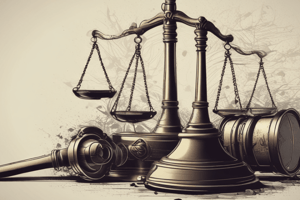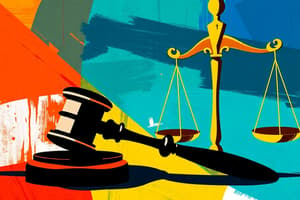Podcast
Questions and Answers
What is the primary difference between mandatory minimum sentences and discretionary sentences in criminal law?
What is the primary difference between mandatory minimum sentences and discretionary sentences in criminal law?
During which stage of the criminal process does a grand jury decide whether to formally charge a suspect?
During which stage of the criminal process does a grand jury decide whether to formally charge a suspect?
What is the purpose of parole in the criminal justice system?
What is the purpose of parole in the criminal justice system?
Which type of criminal law reform aims to reduce incarceration and offer rehabilitation programs for offenders?
Which type of criminal law reform aims to reduce incarceration and offer rehabilitation programs for offenders?
Signup and view all the answers
What is the purpose of a plea bargain in the criminal justice system?
What is the purpose of a plea bargain in the criminal justice system?
Signup and view all the answers
In criminal law, what role does a judge play during the sentencing stage?
In criminal law, what role does a judge play during the sentencing stage?
Signup and view all the answers
What is the Latin term for the physical act or omission that constitutes a crime?
What is the Latin term for the physical act or omission that constitutes a crime?
Signup and view all the answers
Which of the following is a mental state required for a crime under criminal law?
Which of the following is a mental state required for a crime under criminal law?
Signup and view all the answers
What is the requirement for actus reus and mens rea to occur for a crime to take place?
What is the requirement for actus reus and mens rea to occur for a crime to take place?
Signup and view all the answers
Which type of crime is often punishable by imprisonment exceeding one year?
Which type of crime is often punishable by imprisonment exceeding one year?
Signup and view all the answers
What category of crime is typically punishable by less than one year of imprisonment or a fine?
What category of crime is typically punishable by less than one year of imprisonment or a fine?
Signup and view all the answers
What does criminal law aim to protect society from?
What does criminal law aim to protect society from?
Signup and view all the answers
Study Notes
Criminal Law: A Primer on Justice and Punishment
Criminal law is the cornerstone of our legal system, established to protect society from individuals who engage in behavior deemed harmful or threatening. As a complex and ever-evolving area of law, criminal law is a dynamic field that shapes our understanding of justice and punishment. In this article, we'll explore the fundamental concepts and key elements of criminal law, with a focus on criminal law's most significant subtopic: crimes that violate the law and the legal response to these acts.
Elements of a Crime
A crime is a wrongful act or omission that is prohibited by law and punishable by the state. For a crime to have occurred, there must be proof of three key elements:
- Actus Reus (Latin for "guilty act"): The physical act or omission that constitutes the crime.
- Mens Rea (Latin for "guilty mind"): The mental state required for the crime, typically including intent, knowledge, or recklessness.
- Concurrence (of actus reus and mens rea): The act and intent must happen together, and at the same time, for the crime to occur.
Criminal Law Categories
Criminal law is categorized into two primary types:
- Felonies: Serious crimes, often punishable by imprisonment in excess of one year.
- Misdemeanors: Less serious crimes, typically punishable by less than one year of imprisonment or a fine.
Crimes and Penalties
Criminal law encompasses a wide range of offenses, from minor offenses such as speeding to serious crimes like murder. The penalties for these offenses vary depending on the severity of the crime and other factors.
- Mandatory minimum sentences: These are minimum sentences required by law for specific crimes, such as drug trafficking or violent crimes.
- Discretionary sentences: Judges have the discretion to decide the sentence for a crime, taking into account factors such as the defendant's criminal history and the circumstances of the offense.
- Probation: A court-ordered period during which a defendant is supervised in the community instead of being sent to prison.
- Parole: A conditional release from prison for the remainder of a sentence, granted by the state.
- Death penalty: The most severe penalty for certain crimes, allowing for the execution of the defendant.
Criminal Procedure
Criminal procedure governs the steps and processes involved in bringing a criminal case to trial. The criminal process typically follows these stages:
- Investigation: A law enforcement agency investigates a crime, collecting evidence and securing a warrant, if necessary.
- Arrest: The suspect is apprehended and taken into custody.
- Preliminary hearing: The court evaluates the prosecutor's evidence to determine whether there is probable cause to try the case.
- Grand jury: The prosecutor presents evidence to a grand jury, which decides whether to indict (formally charge) the suspect.
- Plea bargain: The defendant and prosecutor negotiate a settlement, typically resulting in a guilty plea and reduced sentence.
- Trial: The case is tried in court, with both sides presenting their evidence and arguments.
- Sentencing: The judge decides the sentence for a defendant found guilty.
- Appeal: Either party may appeal the trial verdict or sentence.
Criminal Law Reform
Criminal law is constantly evolving, with reform efforts and legal challenges working to address the changing needs of society. Reforms may include:
- Alternative sentencing: These measures, such as restorative justice and diversion programs, aim to reduce incarceration and provide rehabilitation and reintegration opportunities for offenders.
- Decriminalization: The removal of criminal sanctions for certain acts, such as drug possession or prostitution.
- Sentencing reform: These efforts aim to reduce the use of mandatory minimum sentences, reduce the over-incarceration of certain populations, and promote fairness in sentencing.
Criminal law is a complex and dynamic field that shapes our understanding of justice and punishment. The ever-evolving nature of criminal law means that there is always more to explore and learn about the legal system that protects and serves our communities.
Studying That Suits You
Use AI to generate personalized quizzes and flashcards to suit your learning preferences.
Description
Explore the fundamental concepts of criminal law, including the elements of a crime, categories of crimes, penalties, criminal procedure, and reform efforts. Learn about felonies, misdemeanors, mandatory minimum sentences, probation, parole, and more.




